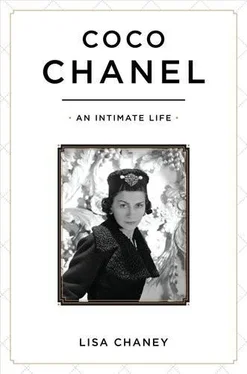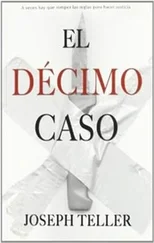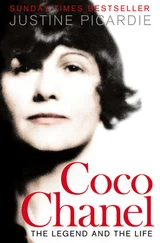As she sat in that Swiss hotel with Paul Morand, Gabrielle’s now unsparing tongue demonstrated the formidably tough exterior few were brave or imaginative enough to challenge. Yet hidden in her armory of words, every now and then, alongside the unrelenting worldliness, Gabrielle revealed her other self, a diffident, fragile and lonely creature. This vulnerable woman who admitted, “I have only ever found loneliness… at the age of six I am already alone,” went on to say defiantly, “It is loneliness which has forged my character, which is bad-tempered, and bronzed my soul, which is proud, and my body which is sturdy.” At the same time, she said, “I have a horror of loneliness and I live in total solitude. I would pay so as not to be alone.” (In fact, she often did. On her annual trips to Italy, for example, she took lovers, saying later, “One doesn’t go to Italy for gentlemen. But I always paid.” 15And reading her comment “I would have the duty police constable sent up so as not to dine alone,” the thought of von Dincklage, there in the background, springs to mind.
Since his arrest by the British in 1945, von Dincklage had been living in Schleswig-Holstein (British zone) with his aunt, Baroness Weber-Rosenkranz. 16But in September 1949, we find him once again in Switzerland, staying at the Hôtel Beau-Rivage in Lausanne. Between December 1949 and January 1950, Gabrielle was also at the hotel. 17Von Dincklage and she had somehow arranged to meet. With Gabrielle, von Dincklage was able to enjoy a well-appointed lifestyle, while Gabrielle didn’t have to send for the “duty policeman” so as not to dine alone, or fend off the idea that “if I let myself slip, I know that melancholy awaits me, open-mouthed.” 18Von Dincklage was still an attractive man who retained his unctuous charm. Even if there was a modicum of sincerity in his feelings for Gabrielle, it is difficult to believe it was much more than convenience that put him at her side.
Meanwhile, Gabrielle, who was as powerful and forthright as she was vulnerable and alone, said she would recall Arthur Capel’s comment to remember that she was a woman and to remind herself, she would stand in front of the mirror where she saw her
two menacing arched eyebrows, my nostrils that are as wide as those of a mare, my hair that is blacker than the devil, my mouth that is like a crevice out of which pours a heart that is irritable but not selfish… My dark gypsy-like skin that makes my teeth and my pearls look twice as white; my body, as dry as a vine-stock without grapes; my worker’s hands…
The hardness of the mirror reflects my own hardness back to me… it expresses what is peculiar to myself, a person who is efficient, optimistic, passionate, realistic, combative, mocking and incredulous, and who feels her Frenchness. Finally, there are my gold-brown eyes which guard the entrance to my heart: there one can see that I am a woman. A poor woman. 19
This same “poor woman” believed she had been put here for a purpose and said, “That is why I endured, that is why the outfit I wore to the races in 1913 can still be worn in 1946, because the new social conditions are still the same as those that led me to clothe them.” Remembering the revolution she had initiated, she described how “I was working toward a new society.” She described clothes until then as being for women who were “useless,” who did nothing for themselves or with their lives. Saying she designed for busy working women, she added that “a busy woman needs to feel comfortable in her clothes. You need to be able to roll up your sleeves.” 20And in the drive to fulfill her destiny, and her deep urge for independence, Gabrielle also understood, and regretted that “I belong to that breed of foolish women, women who think only of their work.” 21
While saying that she had never really known happiness, she also said, “I have never had the time to be unhappy, of existing for another human being, or having children. It is probably not by chance that I have lived alone.” 22
Asking herself where she would go now, Gabrielle continued looking forward: “I don’t know, but I’m going somewhere and it’s not over.” Saying that her reaction to being told that Europe was in ruins made her think that while she felt that Europe was her mother, if it was lagging behind in the world, she would readily leave it behind, as she had done her family, and begin her new life: “I want to be part of what happens. I will go wherever is necessary for that… It will be necessary to do something else. I am ready to start all over again.” 23
This refusal to be bowed by circumstance, as well as the willingness to “start all over again,” was most impressive in a woman of sixty-three. For all her tenacity and verve, however, Gabrielle didn’t have quite the same energy she had possessed thirty years earlier. And yet the icon Coco Chanel had become so intertwined with whoever Gabrielle was, she was unable to relinquish it. As it turned out, what she would take up wasn’t as novel as she might have envisaged when she spoke these words in 1946.
When Gabrielle had agreed with her lawyer, René de Chambrun, that she should leave France and live in Switzerland for a while, she also asked him if he would help her in taking on her partners, the Wertheimers. Gabrielle believed that during the course of the war they had once again defrauded her, and she told Chambrun, “I want revenge.” 24
For several years before the war, convinced that their initial agreement had been a bad one, Gabrielle had intermittently skirmished with the Wertheimers. In the early thirties, for example, they had begun making Chanel perfumes with their own company, Bourjois. They gave sales rights to foreign subsidiaries they had created; from these they also gave Gabrielle her 10 percent profit. This infuriated her. As the business had grown, Gabrielle was increasingly frustrated by what she saw as a reduction of quality in her creation, and had insisted on being released from the original agreement. While the war had interrupted Gabrielle’s initiation of a lawsuit, the conflict between her and her partners only intensified.
At the onset of the war, before leaving France for America, the Wertheimers had cleverly entrusted their business to a cousin, who in turn cleverly appointed a non-Jewish industrialist, Félix Amiot, to be the front for the family. He had continued marketing the Chanel perfumes during the occupation. At the same time, the Wertheimers had set up production of Chanel № 5 in America, where they made yet more perfumes, using natural essences from the south of France, that didn’t follow the original formulas.
These activities, for which Gabrielle was given ridiculously small royalties, continued after the war. Chambrun and the president of the French Bar Association, called in to assist him, advised Gabrielle that “an amicable settlement will bring you much more than litigation.” But relishing the thought of a fight, Gabrielle would not agree. The Wertheimers argued that they had made a major financial contribution to Parfums Chanel, had built it into a worldwide business and that Gabrielle’s contribution was no longer relevant. She was no longer a public figure, and was too old to offer the talent, youth and celebrity she had possessed when she had launched Nº 5. Gabrielle was incensed: “So I’m too old! They think I’m too old, those — bastards!”
In the two months before the case came to trial, Gabrielle was very busy. Eventually, she handed Chambrun several tiny phials and asked him to give these to his wife. Could she make up phials like this from her own home? Chambrun said she could, with the proviso that they must be presents. Josée de Chambrun declared the perfume exquisite, as did a Russian “nose” called in to confirm her opinion. Gabrielle then instructed the perfumer in Switzerland to make up a hundred bottles of her various perfumes. The bottles were not the same design as the originals and were prefixed with the word “Mademoiselle,” making them “different” perfumes, too. Gabrielle then sent them as “gifts’ to all the smartest department stores in New York. The Wertheimers asked her lawyer, “But what does she really want?” Not long afterward, they made a settlement out of court.
Читать дальше












